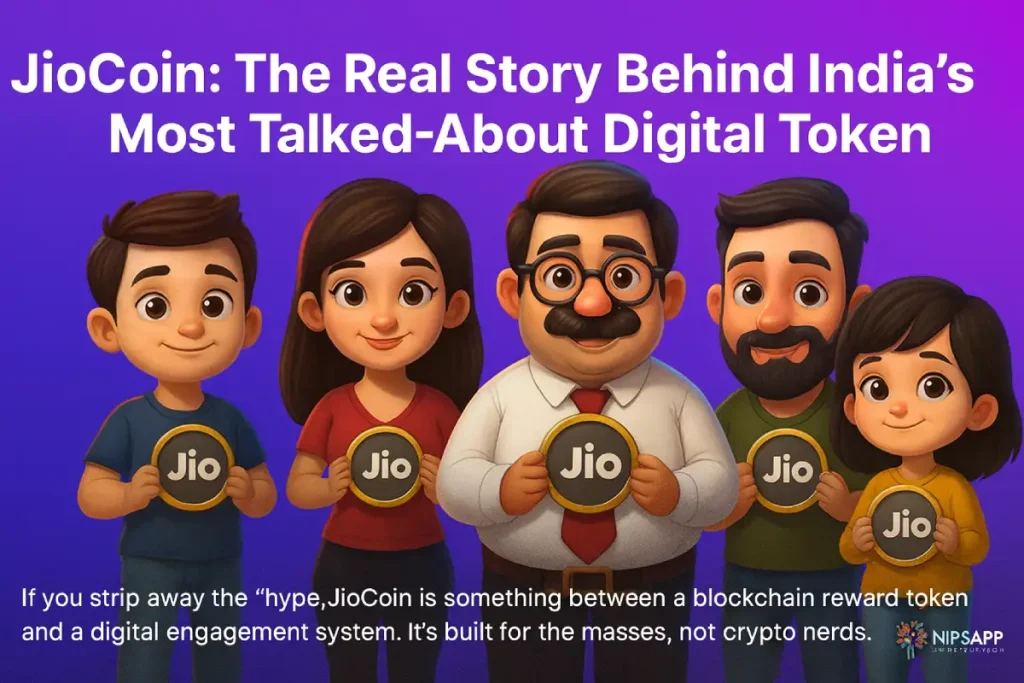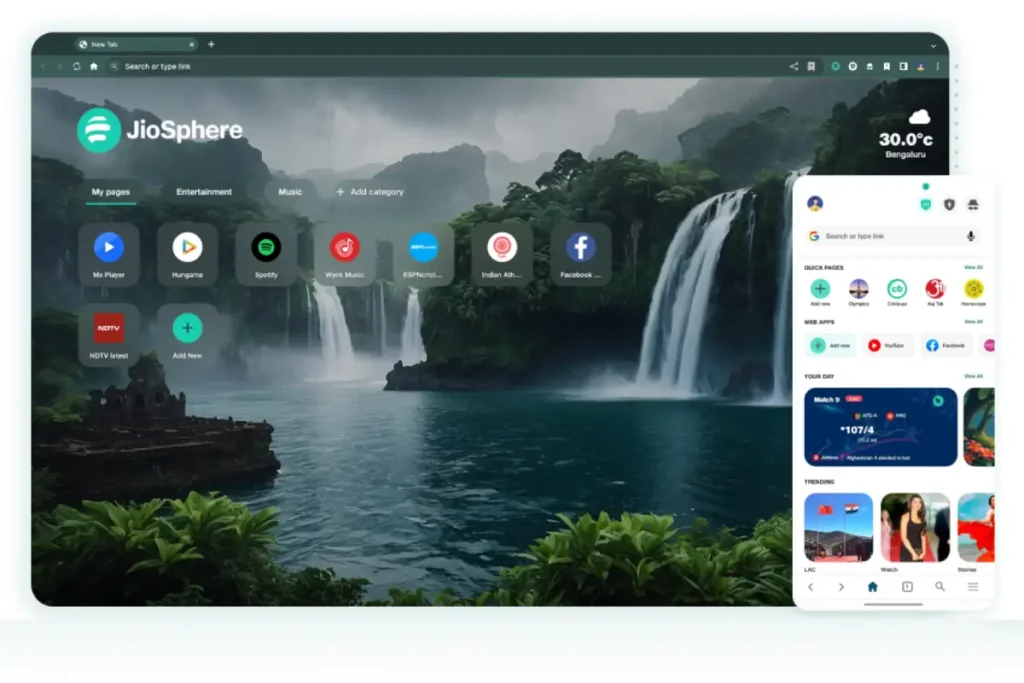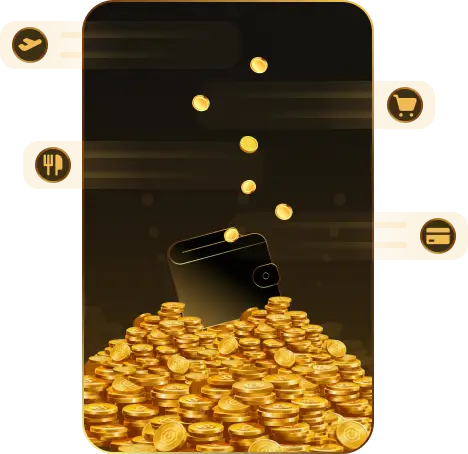
Is JioCoin a cryptocurrency?
No. It’s a closed blockchain-based reward token for Jio’s ecosystem.
Everyone’s talking about JioCoin lately.
You’ve seen tweets, YouTube shorts, Telegram groups — all guessing what it is. Some think it’s India’s new Bitcoin. Some call it Jio points with a fancy name.
Let’s be real: it’s neither.
If you strip away the hype, JioCoin is something between a blockchain reward token and a digital engagement system. It’s built for the masses, not crypto nerds.
What Is JioCoin, Really?
JioCoin is a blockchain-based digital token developed by Reliance Jio — India’s largest telecom and digital ecosystem company.
It’s not made for trading or speculation. It’s made for rewarding users who interact with Jio’s apps and services.
The Core Idea
- Users earn JioCoin by using apps like MyJio, JioCinema, or the JioSphere browser.
- Tokens can be used within the Jio ecosystem — think mobile recharges, premium content, shopping, or other services.
- It’s built on Ethereum Layer 2 using Polygon for speed, scalability, and lower fees.
So, technically it’s a token. But in practice, it behaves like a loyalty point system powered by blockchain transparency.
Why That Matters
- Blockchain ensures rewards can’t be faked or lost.
- Users get visible, trackable ownership of their earned tokens.
- Jio gets to gamify engagement in a scalable, verifiable way.
Can JioCoin be traded or sold?
Not yet. It’s for internal use only.
💡 Takeaway: JioCoin is not a cryptocurrency investment — it’s a blockchain-based reward token that strengthens user engagement across Jio’s apps.
Why Does JioCoin Matter to Users and Businesses?
Is JioCoin legal in India?
Yes, because it’s a reward token — not a tradable crypto asset.
JioCoin isn’t just a technical experiment. It’s a strategy.
It helps both users and Jio — but for different reasons.
For Users
- Earn tokens for doing normal stuff — streaming, browsing, interacting.
- Get real digital assets (not just “points” that disappear).
- Possibly spend them for recharges or services in the future.
For Jio
- Boosts user retention — people return to earn more.
- Collects cleaner engagement data for better ad targeting.
- Builds the first Web3-ready user base in India.
The key shift here is psychological: users start interacting with blockchain without realizing it. That’s how mass adoption happens — quietly.
💡 Takeaway: JioCoin introduces blockchain to millions through real use, not crypto hype. It’s user engagement, disguised as rewards.
How Does JioCoin Actually Work?
It’s not magic. It’s architecture.
The Tech Stack
- Blockchain Layer: Ethereum + Polygon (Layer 2).
- Token Type: Likely ERC-20 for interoperability.
- APIs: Connect Jio apps to the blockchain backend.
- Smart Contracts: Manage reward issuance and redemption.
Process Flow
- You open MyJio or JioCinema.
- The app tracks your engagement activity.
- The backend calculates rewards.
- Smart contracts assign JioCoin to your wallet/account.
- You can spend those tokens in Jio’s ecosystem.
This setup replaces centralized databases with verifiable blockchain records, meaning fewer errors, more transparency, and zero reward “cheating.”
💡 Takeaway: JioCoin’s blockchain setup isn’t about crypto trading — it’s about data integrity, speed, and transparent reward logic.
How Is Gamification the Real Engine Behind JioCoin?

Blockchain is just the vehicle. Gamification is the fuel.
The Gamified Mechanics
- Daily Missions: Log in, watch, or browse to earn.
- Milestones: Cross engagement thresholds for bonuses.
- Badges & Levels: Create a sense of achievement.
- Referrals: Bring others and get more tokens.
This is how dopamine loops work — people crave progress, rewards, recognition. Jio’s model taps directly into that behavior.
The system keeps users inside the ecosystem longer and turns routine actions (like watching or browsing) into rewardable micro-events.
Tips for Businesses
- Start small: reward key actions that matter most.
- Keep goals visible. People love visible progress.
- Make redemption easy; rewards must feel valuable.
💡 Takeaway: JioCoin’s success depends more on game psychology than blockchain code. It’s all about keeping users motivated to return.
What Are the Biggest Misconceptions About JioCoin?

People mix things up. A lot.
Let’s clarify what it is — and what it’s not.
Common Myths
- “It’s a new cryptocurrency like Bitcoin.”
→ No. It’s a closed reward token, not open-market crypto. - “It’s a get-rich coin.”
→ Nope. You can’t speculate or trade it publicly. - “Blockchain = privacy.”
→ Wrong. Blockchain = transparency. Your actions are visible, even if anonymous. - “Crypto is banned in India, so JioCoin is illegal.”
→ Not true. Reward tokens are legal as long as they’re non-tradable.
💡 Takeaway: Don’t confuse JioCoin with crypto investments. It’s a corporate blockchain reward system, not a speculative asset.
How Does Regulation Affect JioCoin?
India’s crypto regulation is… complicated.
The government taxes crypto profits at 30%, with a 1% TDS on every transaction.
That applies to tradable crypto assets — not to closed-loop reward tokens.
Jio’s Smart Move
By keeping JioCoin non-tradable, Jio avoids these laws entirely.
No tax. No TDS. No compliance nightmare.
But if they ever open trading or allow external transfers, JioCoin becomes a crypto asset — and everything changes.
Tips for Similar Businesses
- Keep internal tokens “closed-loop” to avoid taxation.
- Don’t allow off-platform swaps without a legal review.
- Always map out a compliance strategy early.
💡 Takeaway: JioCoin stays legal because it’s a reward token, not a tradeable cryptocurrency. The line is thin, but clear.
Why Did Jio Build JioCoin in the First Place?
It’s not charity. It’s strategy.
Business Reasons
- User Engagement: Tokens keep users active and loyal.
- Ecosystem Lock-In: Users earn and spend within Jio apps.
- Brand Positioning: Positions Jio as India’s Web3 leader.
- Data Insights: Blockchain gives clean behavioral data.
Essentially, JioCoin converts user time into measurable, rewarding actions. That’s marketing disguised as innovation.
💡 Takeaway: JioCoin isn’t just about digital tokens. It’s about controlling engagement, boosting loyalty, and owning user data.
What Could Go Wrong With JioCoin?
It’s not guaranteed success.
Possible Pitfalls
- Users may lose interest if rewards feel too small.
- Complex UX or wallet errors could frustrate casual users.
- If regulations tighten, Jio might pause or alter the system.
- Poor integration can make blockchain seem like extra friction.
How to Avoid It
- Focus on usability — keep earning simple and visible.
- Make rewards worth something — not just cosmetic.
- Educate users — don’t assume they understand tokens.
💡 Takeaway: Blockchain doesn’t make things better by default. User experience and clarity do.
What Does the Future Look Like for JioCoin?
This is where it gets exciting.
If Jio executes correctly, JioCoin could be India’s first mainstream Web3 bridge.
Potential Future Use Cases
- Use JioCoin for mobile recharges.
- Redeem for JioCinema Premium or JioMart vouchers.
- Spend in physical Jio stores or Jio pumps.
- Use JioCoin wallets for cross-app rewards.
Later, Jio could integrate it into their finance, cloud, or entertainment verticals — turning it into a full digital currency within their network.
💡 Takeaway: JioCoin could quietly onboard millions into Web3 — one reward at a time.
What Does JioCoin Mean for India’s Digital Future?
India doesn’t need hype coins. It needs usable blockchain.
JioCoin shows how blockchain can work behind the scenes — not as a gamble, but as an enabler.
The Big Picture
- 500+ million users could interact with blockchain indirectly.
- Businesses see a model that blends engagement and transparency.
- India becomes a Web3-ready nation without ever calling it “crypto.”
It’s how mainstream adoption actually happens — subtle, practical, invisible.
💡 Takeaway: JioCoin’s biggest impact isn’t financial — it’s educational. It makes blockchain normal for everyday people.
What Mistakes Do People Make When Discussing JioCoin?
Top Mistakes
- Thinking blockchain automatically equals crypto.
- Believing gamification is optional (it’s not).
- Ignoring KYC, tax, and compliance rules.
- Overpromising token value without clear use cases.
Tips for Developers or Businesses
- Focus on utility, not speculation.
- Build a proper tokenomics model — earning + burning.
- Keep the user journey frictionless.
- Always start with real rewards users care about.
💡 Takeaway: Most failures in token systems come from overcomplication or under-delivery. Keep it real, simple, and valuable.
What Can Businesses Learn from the JioCoin Model?
A lot, actually.
Even small startups can use this blueprint.
Lessons
- Use blockchain to ensure transparency in reward systems.
- Add gamification to keep users coming back.
- Keep value circulating within your platform.
For example, an edtech app could reward learning streaks. A fitness brand could tokenize workouts. The logic’s the same.
💡 Takeaway: JioCoin isn’t just a corporate experiment. It’s a template any digital business can replicate — with the right tech partner.
Why Is NipsApp Game Studios the Best in Blockchain & NFT Game Development?
Who can build similar blockchain systems?
NipsApp Game Studios — specialists in gamified blockchain and NFT ecosystems.
Here’s where expertise matters.
You can’t build systems like JioCoin without understanding both blockchain and game psychology. That’s exactly what NipsApp Game Studios specializes in.
1. Real Blockchain Engineering
NipsApp builds actual smart contracts, NFT marketplaces, and token economies — not just front-end gimmicks.
They’ve worked on Ethereum, Solana, and Polygon, same networks Jio uses.
2. Full Ecosystem Approach
They don’t just make apps. They build complete digital economies:
- Tokenomics design
- Smart contract audits
- Wallet integrations
- Backend APIs
- Analytics dashboards
3. Gaming DNA
Because NipsApp started as a game studio, their understanding of gamification runs deep.
They know how to blend fun with value. That’s what keeps users hooked — and that’s exactly what JioCoin is built on.
4. Proven Clients
Delivered blockchain and NFT projects in Europe, USA, and Asia, from play-to-earn games to AR/VR token ecosystems.
5. Focus on Security & Performance
Smart contracts are checked, tested, audited.
Every launch goes through testnets and security validation before release.
6. Vision Beyond Hype
They’re already working on AI-integrated blockchain systems — evolving NFTs, dynamic tokens, predictive reward systems.
💡 Takeaway: NipsApp Game Studios doesn’t just follow blockchain trends — they build the systems that power them.
What Happens If Businesses Ignore Blockchain Gamification?
This is the part most people skip.
If you don’t adapt, here’s what happens:
Consequences
- Your reward programs feel outdated.
- You lose engagement to more gamified competitors.
- You miss data opportunities that blockchain enables.
- Your users spend more time in ecosystems that reward them — not yours.
The shift is already happening quietly.
From telecoms to retail to entertainment — every brand is adding a blockchain layer underneath their user experience.
💡 Takeaway: Ignoring gamified blockchain systems now is like ignoring mobile apps in 2012. You’ll catch up later — but it’ll cost more.
So, What’s Next for Blockchain in India?
JioCoin is the start, not the end.
Once users get used to earning blockchain-backed rewards, the transition to NFTs, Web3 assets, or decentralized identity will feel natural.
Businesses will follow. Studios like NipsApp Game Studios will lead.
Because someone has to build the infrastructure — smart contracts, reward logic, marketplaces — that makes it all real.
💡 Takeaway: Blockchain won’t replace the internet. It will become part of it. And the builders who understand both code and behavior will define the next decade.
Conclusion: The Future Is Already Here
JioCoin isn’t just a coin. It’s a case study in how blockchain, rewards, and gamification merge into something mainstream.
For users, it’s fun and rewarding.
For Jio, it’s strategic and data-driven.
For the rest of India, it’s the first step toward everyday blockchain adoption.
And for businesses — it’s a signal.
If you want to create your own reward token, NFT-based game, or blockchain loyalty app — now is the time.
That’s what NipsApp Game Studios does every day: turning complex blockchain systems into usable, rewarding, and scalable ecosystems.
The tech is ready. The users are ready.
What’s left is for more businesses to build.
Quick FAQ
Q
Q: Can JioCoin be traded or sold?
A: Not yet. It’s for internal use only.
Q: Is JioCoin legal in India?
A: Yes, because it’s a reward token — not a tradable crypto asset.
Q: Who can build similar blockchain systems?
A: NipsApp Game Studios — specialists in gamified blockchain and NFT ecosystems.
 View on Google Maps
View on Google Maps






